Context-specific emergence and growth of the SARS-CoV-2 Delta variant
Coronavirus (COVID-19) Response

COVID-19 Response
The COVID-19 pandemic is creating a vast and growing range of challenges for societies worldwide. A number of the Oxford Martin School’s programmes tackle the type of issues that the pandemic presents, so researchers have quickly been able to turn their focus to COVID-19.
Additionally, the School and its academics are involved in a number of high-level partnerships to accelerate and improve national and global responses to the outbreak.
Our COVID-19 response work includes:
The Oxford Martin Programme on Pandemic Genomics is involved in a wide range of rapid-response research papers to understand the spread of the disease and predict how it might move in the future. Many of its researchers are volunteering for, or part-seconded to, the COVID-19 Genomics UK (COG-UK) consortium, including Professor Oliver Pybus, who contributed to the discovery of the B.1.1.7 and P.1 variants of concern.
It also initiated and co-leads the Open COVID-19 Data Working Group, which has created an open-access database to track the coronavirus on a case-by-case basis. With funding and support from Google.org, The Rockefeller Foundation and the Oxford Martin School this work forms the underpinning for Global.health, an open data platform for digital epidemiology.
Pandemic Genomics researchers, in collaboration with the University of Edinburgh, also designed the Pango nomenclature that allows us to discuss the B.1.1.7, B.1.351, P1 and other variants. Funding from the Oxford Martin School will support researchers to transition the Pango classification system from a volunteer research project to a stable body with a secure future, to deal with future data growth.
Our World in Data - a collaboration between the Oxford Martin Programme on Global Development and the non-profit, Global Change Data Lab - now collates global, country-by-country and, where available, state-by-state data on vital COVID-19 metrics including confirmed cases, deaths, hospitalisations, and policy responses.
It has built and maintains the global database on COVID-19 testing and the leading global database on vaccinations. Over the course of the pandemic, it has had more than 100 million users and in 2020 its rate of academic citations was above 15 per day.
The Oxford Martin Programme on Misinformation, Science and Media has been actively working with government to ensure policymakers have the latest information on public understanding of the sources, consequences, and best health practices around COVID-19. They are also looking deeper into the sources of health misinformation and how it travels online. Professor Phil Howard has also been awarded funding under the School’s rapid-response ‘Building Back Better’ research grants to launch a new related initiative to help counter the spread of misleading health information, particularly around COVID-19 vaccinations.
Three further initiatives were also launched by this rapid-response funding call. The Oxford Martin Initiative on a Net Zero Recovery aims to harness governments’ huge fiscal injections to accelerate economies shifts to net zero carbon emissions. The Oxford Martin Initiative on Levelling-up Britain’s Regions is building an evidence-led and targeted approach to deliver successful regional turnarounds. The existing Oxford Martin Programme on Integrating Renewable Energy has also been supported to launch a related initiative to shift society’s approach to energy and accelerate net-zero living.
The School is also supporting the work of The Oxford COVID-19 Government Response Tracker (OxCGRT) to enable it to expand its remit to cover government vaccine policies around the world.
Other Oxford Martin School programmes and people such as Illegal Wildlife Trade, Collective Responsibility for Infectious Disease and the Future of Development are also involved in work that connects to the pandemic and the multiple challenges it is causing. Work from across all our programmes related to the pandemic is collated below.

Our World In Data
Our World In Data, the flagship output of the Oxford Martin Programme on Global Development, has developed a unique and constantly evolving overview of all the major sources of data on the COVID-19 coronavirus and how they help to answer to the most frequently asked questions about the outbreak. Its resource is accessible to the public and works to convey the most important data-led information in an easy-to-use and easy-to-read way.
COVID-19 research and publications
Given the informal and preliminary nature of these pre-prints and papers they may be subject to change.
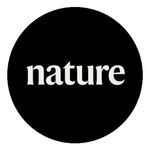

Lessons of the Israeli-Palestinian Conflict for Public Health: The Case of the COVID-19 Vaccination Gap
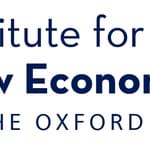
COVID-19 restrictions in the US: wage vulnerability by education, race and gender

The Water-Energy-Food Nexus and COVID-19: Towards a Systematization of Impacts and Responses

“Saving Lives, Protecting Livelihoods, and Safeguarding Nature”: Risk-Based Wildlife Trade Policy for Sustainable Development Outcomes Post-COVID-19

The COVID-19 shock on the labour market: Poverty and inequality effects across Spanish regions

The readiness of industry for a transformative recovery from COVID 19

Beyond (Mis)Representation: Visuals in COVID-19 Misinformation

Beyond banning wildlife trade: COVID-19, conservation and development

COVID-19, Systemic Crisis, and Possible Implications for the Wild Meat Trade in Sub-Saharan Africa
How will the COVID-19 pandemic impact food security and virtual water “trade”?

Technology at Work v5.0 - A New World of Remote Work
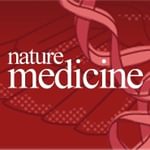
Monitoring key epidemiological parameters of SARS-CoV-2 transmission
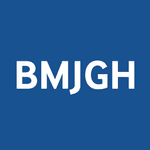
Vaccine nationalism and internationalism: perspectives of COVID-19 vaccine trial participants in the United Kingdom

The challenges of Covid-19 pandemic on improving plastic waste recycling rates

A Dataset of COVID-Related Misinformation Videos and their Spread on Social Media

A global database of COVID-19 vaccinations

Higher risk of death from COVID-19 in low-income and non-White populations of São Paulo, Brazil

SARS-CoV-2 elimination, not mitigation, creates best outcomes for health, the economy, and civil liberties

National COVID debts: climate change imperils countries’ ability to repay

Accelerating National Genomic Surveillance
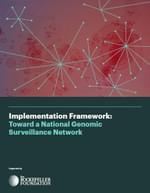
Implementation Framework: Toward a National Genomic Surveillance Network

Investigating the risks of removing wild meat from global food systems
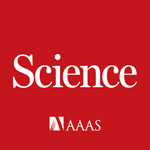
Establishment and lineage dynamics of the SARS-CoV-2 epidemic in the UK

Social and racial inequalities in COVID-19 risk of hospitalisation and death across São Paulo state, Brazil

Crowding and the shape of COVID-19 epidemics

The US excess mortality rate from COVID-19 is substantially worse than Europe’s
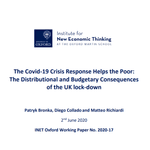
The Covid-19 Crisis Response Helps the Poor: The Distributional and Budgetary Consequences of the UK lockdown
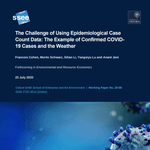
The Challenge of Using Epidemiological Case Count Data: The Example of Confirmed COVID-19 Cases and the Weather

The scale and dynamics of COVID-19 epidemics across Europe

Preliminary analysis of SARS-CoV-2 importation & establishment of UK transmission lineages

Genomic surveillance reveals multiple introductions of SARS-CoV-2 into Northern California

Democracy, Culture and Contagion: Political Regimes and Countries Responsiveness to Covid-19
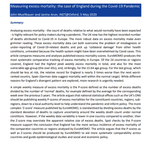
Measuring excess mortality: the case of England during the Covid-19 Pandemic
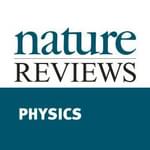
Modelling COVID-19

Genomic epidemiology of SARS-CoV-2 in Guangdong Province, China
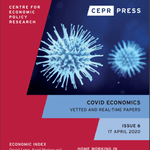
Supply and demand shocks in the COVID-19 pandemic: An industry and occupation perspective
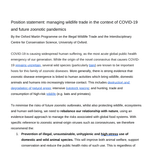
Position statement: Managing wildlife trade in the context of COVID-19 and future zoonotic pandemics
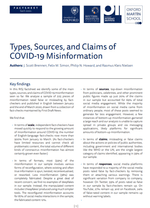
Types, Sources, and Claims of COVID-19 Misinformation

An investigation of transmission control measures during the first 50 days of the COVID-19 epidemic in China

The effect of human mobility and control measures on the COVID-19 epidemic in China
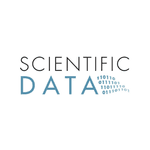
Epidemiological data from the COVID-19 outbreak, real-time case information

Estimating the asymptomatic proportion of coronavirus disease 2019 (COVID-19) cases on board the Diamond Princess cruise ship, Yokohama, Japan, 2020

First cases of coronavirus disease (COVID-19) in Brazil, South America

Open access epidemiological data from the COVID-19 outbreak

Preparedness and vulnerability of African countries against importations of COVID-19: a modelling study

Potential for global spread of a novel coronavirus from China

Pneumonia of Unknown Etiology in Wuhan, China: Potential for International Spread Via Commercial Air Travel
news and opinion from the oxford martin school
Story of the UK’s COVID-19 Delta variant epidemic revealed by genome tracing
A team of researchers led by Oxford and Edinburgh have today revealed how the Delta variant of COVID-19 became the dominant variant across the UK in 2021.
Can news help? New evidence on the links between news use and misinformation
"Our findings challenge the notion that, by drawing attention to false content, news leave people more misinformed," writes Rasmus Nielsen
How can governments end the COVID-19 pandemic?
We are now into the second year of life with COVID-19. Although we have overcome the first enormous challenge of swiftly developing and approving several effective vaccines, we are far from ending the pandemic.
The COVID-19 Pandemic and Older Adults: Institutionalised Ageism or Pragmatic Policy?
The Covid pandemic has produced a plethora of editorials and commentaries by professional bodies on the specific impact of the SARS-CoV-2 virus and resultant disease COVID-19 on older adults. Threading throughout these is a fundamental framing of the discourse around ageism, age discrimination and the use of chronological age as a homogeneous determinant of societies’ acceptable response to the challenge of the vulnerability of older people to the disease.
Our World in Data awarded Covid Innovation Heroes Award
Our World in Data has been celebrated for its work on the global COVID-19 pandemic, receiving one of The Oxford Trust’s Covid Innovation Heroes Awards for 2021, part of the High Sheriff of Oxfordshire’s Covid Heroes programme.
Vaccinate the world, say Oxford vaccine trial participants
National pride in the Oxford-AstraZeneca vaccine does not outweigh desire for global greater good, suggests study with trial participants
Alpha variant spread via ‘super-seeding’ event within UK
The rapid spread of the Alpha variant of COVID-19 resulted from biological changes in the virus and was enhanced by large numbers of infected people ‘exporting’ the variant to multiple parts of the UK, in what the researchers call a ‘super-seeding’ event.
Cities could be MORE important post-pandemic, not less
Paradoxically, more in-person work environments and the concentration of jobs in cities could be a medium- to long-term impact of the pandemic’s shift to remote working, suggests Citi GPS Technology at Work v6.0: The Coming of the Post-Production Society.
Team behind SARS-CoV-2 naming system formalised as the Pango Network
Researchers at the Universities of Oxford and Edinburgh have announced the formalisation of the Pango Network, an international team of experts to oversee the identification and naming of different lineages of SARS-CoV-2 virus.
COVID-19 elimination, not mitigation, creates best outcome for health, economy, and civil liberties
Countries that aimed for COVID-19 elimination registered fewer deaths, better economic performance, and less restrictions and lockdowns, shows a paper published today in The Lancet.
Four new initiatives launched to support ‘Building Back Better’ from COVID-19
The Oxford Martin School has launched four new solutions-focused research initiatives, designed to make an immediate difference in helping the world ‘build back better’ from the COVID-19 pandemic.
Climate change imperils countries’ ability to repay COVID debts
Most governments’ borrowing during the pandemic pays scant attention to the effects that climate change could have on their ability to repay the debt, researchers at Oxford University find.
It is the debt which kills the person: Mobile livelihoods in Delhi
To understand the impacts of the pandemic on different groups it is important to engage with the experience at the margins of society and to examine the socially and long-lasting effects of the virus.
Research consortium including Oxford University and Google.org announce new platform to track COVID-19 data
Google.org, the charitable arm of Google, the University of Oxford and other leading institutions including Boston Children’s Hospital and Northeastern University, today launched Global.health.
Banning wild meat could increase biodiversity loss, reveals study
A blanket ban on the trade of wild meat could create risks for nature and for human health, finds a first of its kind study from an international group of researchers.
COVID-19 transmission chains in the UK traced through time and space
A team of scientists, led by researchers from the Universities of Oxford and Edinburgh, has analysed the first wave of the Covid-19 outbreak in the UK and produced the most fine-scaled and comprehensive genomic analysis of transmission of any epidemic to date.
The need for open data sharing in the era of global pandemics
Research emphasises need for COVID-19 vigilance in tight-knit communities
Small, close-knit communities are at high risk for rapid, intense COVID outbreaks, especially if they haven’t yet experienced outbreaks of COVID-19, shows a new study by the University of Oxford and Northeastern University, Boston.
We still don’t know if warmer weather slows down the spread of COVID-19
The arrival of summer in the Northern Hemisphere has caused increased interest, from both the research community and the public at large, about the possibility that warmer weather might slow the spread of COVID-19.
COVID-19, intellectual property and access
Will the current system of drug innovation and access to medicines meet global expectations?
Researchers providing vital public information in the fight against COVID-19
Oxford Martin School researchers played a key role in contributing scientific research for ‘Coronavirus: The Science Explained’, a website created by UK Research & Innovation (UKRI).
Experts defend safety of reusables during COVID-19 pandemic
Academics including Professor Charlotte Williams, one of the Oxford Martin Programme on the Future of Plastics’ lead researchers, have sought to reassure the public that reusable containers are safe to use during the current Covid-19 pandemic.
New report shows that COVID-19 has accelerated the shift to remote working
The fifth edition in the Citi GPS Technology at Work series, A New World of Remote Work, looks at how COVID 19 fast-forwarded existing trends and quantifies the possible impact of these trends on the future of work.
Challenging Circumstances: we need international guidelines for human infection studies
Would you be willing to infect yourself with coronavirus to test a vaccine?
Democracies have responded more effectively to COVID-19 than autocracies, study shows
Autocracies imposed harsher lockdowns but democracies have responded more effectively to COVID-19.
Researchers use virus genomic tracking to reveal the rise and fall of the COVID-19 epidemic in Guangdong Province
COVID-19 US employment shocks 'likely larger than Great Depression'
The U.S. is likely to see a near-term 24% drop in employment, 17% percent drop in wages, and 22% drop in economic activity as a result of the COVID-19 crisis, according to a new study from the Institute for New Economic Thinking at the Oxford Martin School.
Coronavirus: why a blanket ban on wildlife trade would not be the right response
The COVID-19 ‘infodemic’: what does the misinformation landscape look like and how can we respond?
Navigating the COVID-19 'infodemic' - how are people accessing news and information?
A new report from the Oxford Martin School's Misinformation, Science and Media programme analyses how people in six countries - Argentina, Germany, South Korea, Spain, the UK and the US) - accessed news and information about COVID-19 in the early stages of the global pandemic.
Why vaccines should be compulsory
China’s control measures may have prevented 700,000 COVID-19 cases
The world before this coronavirus and after cannot be the same
COVID-19: Study shows that travel restrictions are most useful in the early and late phase of an epidemic
Analysis of human mobility and epidemiological data by a global consortium of researchers, led by the University of Oxford and Northeastern University, shows that human mobility was predictive of the spread of the epidemic in China.
Open data is a leap forward in how we tackle global disease outbreaks
The scope of COVID-19 transmission is global, but we have in place a global understanding that enables a better-informed global response than has ever been possible before.
COVID–19 has intensified concerns about misinformation. Here's what our past research says about these issues
The production and the spread of misinformation have become major concerns for scholars, policy makers, and commentators across the world.
China's Announcement on Wildlife Trade - What’s New and What Does It Mean?
Contagion: the systemic risks of globalisation
The spread of COVID-19 is alarming. But not surprising. Globalisation creates systemic risks. More flows between countries make risks more contagious.
Coronavirus: Egypt, Algeria and South Africa are the main gates for importation in Africa
Egypt, Algeria and Republic of South Africa are the African countries most at risk for coronavirus COVID-19 importation in the continent, due to high air traffic with the contaminated Chinese provinces. But these countries are also among the best equipped on the continent to quickly detect and deal with new cases.
Air travel could spread Wuhan pneumonia to further international locations
There is currently an outbreak of a pneumonia of unknown etiology in Wuhan, China.
our covid-19 response in the press
Why call it BA.2.12.1? A guide to the tangled Omicron family
Covid Innovation Heroes celebrated by High Sheriff of Oxfordshire with Oxford Trust awards
When did Omicron Covid variant arrive in UK and is it spreading?
Cities could be MORE important post-pandemic, not less, suggests report from Citi and University of Oxford
How do COVID-19 variants get their names?
COVID-19: how rising inequalities unfolded and why we cannot afford to ignore it
Covid offers ‘step change’ for employment flexibility
People who suffer rare reactions after vaccines ‘left in the dark’ without any support, warn families
Countries that tried to eliminate Covid-19 have seen the least economic damage and fewest deaths
Policies to eliminate Covid instead of mitigating it through lockdowns were better for the economy and saved more lives, study claims
The zero-sum vaccine game: How a dose in the U.S. takes a dose away from a poorer country
Coronavirus was introduced to the UK more than 1,000 TIMES in early 2020 with the majority of transmissions traced back to Spain, France and Italy
UK travel restrictions: Grant Shapps says new Covid variants have made border tests much more urgent
Covid reached UK in three waves from southern Europe, study shows
Reusable containers safe to use during coronavirus pandemic, doctors and scientists say
Reusable containers safe during Covid-19 pandemic, say experts
With unprecedented amounts of genetic data, researchers are tracking how COVID-19 mutates around the world
How can international travel resume during the coronavirus pandemic?
Going Viral: Did Covid-19 spread in Britain come from Europe itself?
Coronavirus: COVID-19 was brought into UK by 1,300 travellers, mainly from Europe - study finds
How Data Became One of the Most Powerful Tools to Fight an Epidemic
Almost two-thirds of coronavirus cases in UK originated from Spain and France
Democracies contain epidemics most effectively
Las democracias son más efectivas contra el coronavirus
'Another Wuhan in the making?': Undercover in a Thailand market selling live animals
Die Corona-Pandemie ist die vielleicht letzte Chance zum Umdenken beim Klimawandel
Will global collaboration against COVID-19 succeed?
Covid-19 will only increase automation anxiety
Influencers among 'key distributors' of coronavirus misinformation
The Fallout: The Future of Health
On Twitter, almost 60 percent of false claims about coronavirus remain online — without a warning label
Nearly 40% of world's population living in countries with closed borders amid coronavirus outbreak, analysis finds
Will coronavirus reverse globalisation?
Antibiotic Resistance Could Lead to More COVID-19 Deaths
China coronavirus cases: Measures could have prevented 700,000 COVID-19 cases
China lockdown may have blocked 700,000 virus cases: Researchers
China lockdown may have blocked 700,000 coronavirus cases: Researchers
Ian Goldin: «Mal gérée, la globalisation peut avoir de fâcheuses conséquences»
What the cruise-ship outbreaks reveal about COVID-19
Trafficked pangolins can carry coronaviruses closely related to pandemic strain
Globalisierung lässt sich nicht einfach zurückdrehen
Viral Inequality
Asian countries risk new waves of coronavirus infections when they lift lockdowns. The same could happen in the rest of the world.
The spread could have been worse: Lockdowns and travel restrictions stifled the coronavirus outbreak in China from Wuhan by 92 percent, new study reveals
Coronavirus: Science, stop spostamenti più utile in fase iniziale e finale epidemia
Un estudio concluye que el cierre de Wuhan se produjo "demasiado tarde"
Pandemics in the age of hyperconnectivity
I’m a researcher who’s helped change how we tackle pandemics like coronavirus forever – this is what we’ve learned
HARDtalk - Professor Ian Goldin on coronavirus, globalisation and the potential for recession
Online Map Tracks Coronavirus Outbreak in Real Time
A Global Outbreak Is Fueling the Backlash to Globalization
Coronavirus shows how globalisation spreads contagion of all kinds
Strategies shift as coronavirus pandemic looms
Coronavirus and the race to distribute reliable diagnostics
COVID-19 and artificial intelligence: protecting health-care workers and curbing the spread
Scientists are racing to model the next moves of a coronavirus that’s still hard to predict
Programmes
View allFuture of Work
Find out more
Collective Responsibility for Infectious Disease
Find out more
Renewable Energy
Find out more
Global Development
Find out more
Wildlife Trade
Find out more
Misinformation, Science and Media
Find out more
Pandemic Genomics
Find out more
Future of Development
Find out more
Net Zero Recovery
Find out more
Keep in touch
If you found this page useful, sign up to our monthly digest of the latest news and events
Subscribe